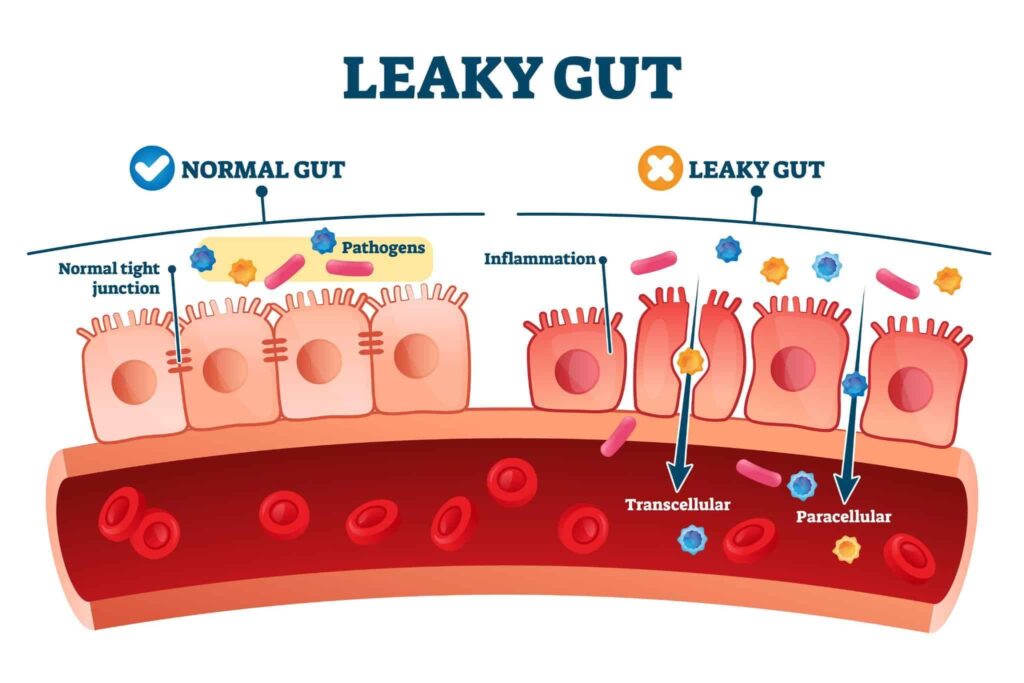Leaky Gut: 10 Signs You May Have It and What You Can Do to Fix It
Leaky gut syndrome (LGS) is an intestinal condition characterized by a diseased or damaged gastrointestinal lining. Currently, it is a proposed disorder and has not been accepted as a medical diagnosis by most health professionals. However, many naturopathic and integrative practitioners believe that LGS is real and may be responsible for a variety of chronic illnesses, such as food allergies, inflammatory bowel disease (IBD), irritable bowel syndrome (IBS), autoimmune diseases, skin conditions like eczema and psoriasis and even mood disorders like anxiety and depression.
This article will better acquaint you with what leaky gut syndrome is and discuss some of the signs that you may have it. Additionally, we will provide some top tips on how to heal your gut if you suffer from LGS, including the right foods to eat and the best supplements for leaky gut.
Table of Contents
What Is Leaky Gut Syndrome?
As mentioned, leaky gut syndrome is a proposed intestinal condition characterized by a diseased or damaged gastrointestinal lining. This damage allows undigested food particles, toxins and other microbes to “leak” out of the intestines and into the bloodstream. When these substances enter the bloodstream, they can trigger an immune response and cause inflammation throughout the body.

You may also hear leaky gut syndrome sometimes referred to as increased intestinal permeability. However, there is currently no definitive test for LGS. Regardless, many practitioners believe that it can be diagnosed based on symptoms and other tests, such as food allergy testing, stool tests and blood tests.
Read: Symptoms for IBS
What Causes Leaky Gut Syndrome?
Many factors are believed to contribute to the development of leaky gut syndrome, including:
- Diet – A diet high in sugar, refined carbs and alcohol can contribute to LGS. Additionally, a diet lacking healthy fats, fiber and antioxidants can also lead to gut dysbiosis and inflammation.
- Stress – Chronic stress can lead to lowered immune function and increased inflammation, which can contribute to LGS.
- Medications – Non-steroidal anti-inflammatory drugs (NSAIDs), antibiotics and proton pump inhibitors (PPIs) have been linked to LGS.
- Gut Infections – Bacterial, viral and parasitic infections can damage the gut lining and lead to LGS.
- Other Health Conditions – Celiac, Crohn’s and autoimmune diseases have been connected to LGS. However, there is still debate on whether they cause LGS or are caused by it.
Signs You May Have Leaky Gut Syndrome
There are several signs and symptoms that are associated with leaky gut syndrome. These include:
- Digestive Issues – Gas, bloating, diarrhea, constipation and abdominal pain are all common signs of LGS.
- Food Sensitivities – If you have LGS, you may find that you are suddenly sensitive to foods that you used to be able to eat without any problems. These sensitivities can manifest as hives, rashes, itching, swelling and gastrointestinal distress.
- Mood Disorders – Leaky gut has been linked to mood disorders like anxiety and depression. This is believed to be since LGS can increase inflammation throughout the body, which has been connected to these mood disorders.
- Skin Issues – Skin conditions like eczema, psoriasis and rosacea have been linked to LGS. This is believed to be because LGS can increase inflammation and build up toxins in the skin.
- Autoimmune Diseases – LGS has also been linked to autoimmune diseases. This is believed to be because LGS can increase inflammation and allow undigested food particles and toxins to enter the bloodstream, triggering an autoimmune response.
- Fatigue – Chronic fatigue is a common sign of LGS. This is because LGS can lead to nutrient deficiencies, gut dysbiosis and increased inflammation.
- Brain Fog – Brain fog, or the feeling of being mentally unclear, has also been linked to LGS. This is believed to be because LGS can increase inflammation, leading to a build-up of toxins in the brain, causing brain fog.
- Joint Pain – Joint pain is another common sign of LGS. This is believed to be because LGS can lead to inflammation and a build-up of toxins in the joints.
- Headaches – Headaches are also a regular sign of LGS. This is believed to be since LGS can lead to inflammation and a build-up of toxins in the head.
- Weight Gain – LGS can also lead to weight gain. This is because LGS can lead to nutrient deficiencies, gut dysbiosis and increased inflammation.
Read: Symptoms of an Unhealthy Gut
Top Tips for Dealing with Leaky Gut Syndrome
If you think you may have leaky gut syndrome, there are some things you can do to help heal your gut and improve your symptoms. These include:
- Eliminating Trigger Foods – If you have LGS, you will need to eliminate trigger foods from your diet. Common trigger foods include gluten, dairy, soy, sugar and processed foods. In addition, you may want to consider following specialized diets, such as a low-FODMAP Diet or the Specific Carbohydrate Diet (SCD).
- Adding in Gut-Healing Foods – You will also need to add in gut-healing foods in addition to eliminating trigger foods. These include bone broth, fermented foods and probiotic-rich foods.
- Taking Gut-Healing Supplements – Several gut-healing supplements can help heal LGS. These include probiotics, glutamine, zinc and omega-3 fatty acids. But remember: The best probiotic for gut health is one you remember to take, so reach for a leaky gut powder that you can easily add to a smoothie to ensure it’s a part of your daily routine.

- Reducing Stress – Stress can contribute to LGS, so it is vital to find ways to reduce stress in your life. This may include yoga, meditation and deep breathing exercises.
- Getting Enough Sleep – Getting enough sleep is also essential for reducing stress and healing LGS. Aim for seven to nine hours of sleep per night.
- Exercising – Exercise can also help reduce stress and promote gut healing. But it’s important to listen to your body and not overdo it.
- Working with a Holistic Practitioner – If you are struggling to heal your gut independently, working with a holistic practitioner can be helpful. They can provide you with personalized dietary and supplement recommendations and help you manage stress and heal emotionally.
Read: Everything You Need To Know About Your Gut
Final Thoughts
When you’re suffering from leaky gut syndrome and plagued by the symptoms we described, it can feel like you’re never going to feel better. But the good news is that there are many things you can do to heal your gut and improve your condition. So, don’t give up hope and keep working towards gut health!
Do you think you may have leaky gut syndrome? Have you tried any of the gut-healing strategies we’ve discussed? Share your thoughts and experiences in the comments section below!
Recommended Articles:
What’s The Latest On Peanut Allergy?




